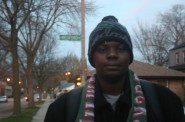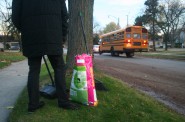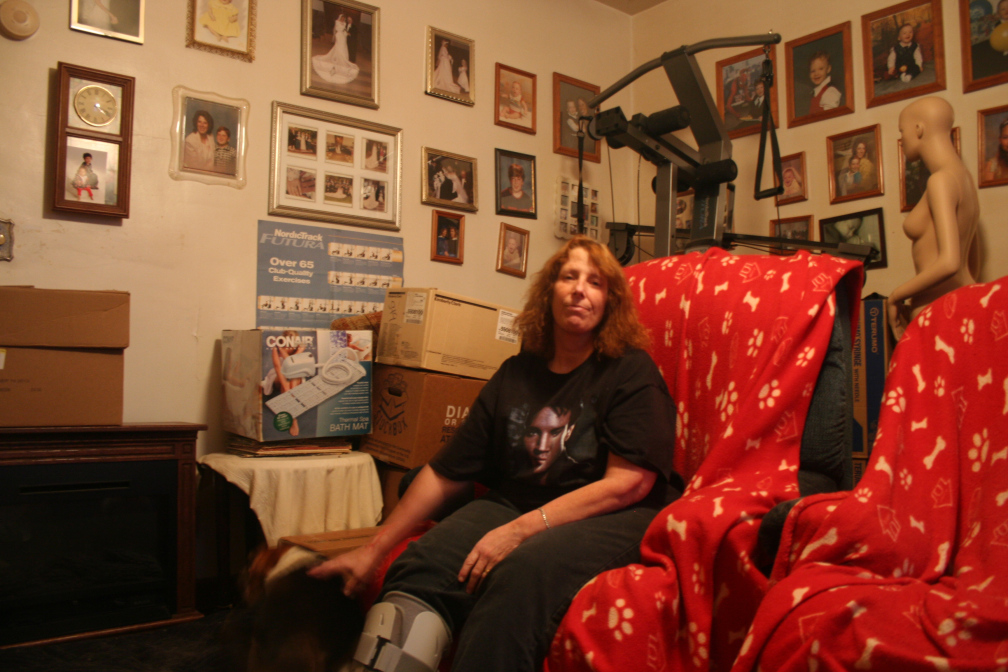“I have no trust in the judicial system.”
Lu Ann Will's mentally-ill son was shot by police answering her call for help. She still doesn't understand how it happened.
After a multi-year period of living with his father near 13th and Scott, not working and not seeing much of his son because of, among other factors, poor living conditions at the home, Walker finally came back to live with his mother. “Once my son told me he had cancer and needed to come home, I had him come home,” says Will. “It was devastating to me – I thought I was gonna lose my son to cancer.”
Apparently, Walker had been diagnosed about a year before the April 6th incident. “He was supposed to come home and die,” says Will. “He said he had lung cancer.”
But, when Will wanted a second opinion, Walker wasn’t having any of it. “No, he didn’t want nothin’ to do with––he didn’t want no treatment, at all,” she says.
“So, uh, after the year went by, then, all of a sudden, he started having grand mal seizures. And, turns out that he was in the hospital, like, every other week – he was having seizures left and right. Turned out it was from not havin’ the Ambien in his system,” says Will.
Walker had, in lieu of medical treatment, been self-medicating and as a result, was experiencing intense withdrawals. “He would take some (Ambien), he was drinkin’ a little beer with it, he’d wait a while and take more and, then, he’d forget and, by the time the next day rolled around, all his medicine was gone. I didn’t know he was doin’ that until he came home from the hospital the second or third time he was hospitalized and he ate the whole doggone prescription. I’m like, ‘What the heck are you doing?’”
Despite this turn of events, Will is hesitant to believe her son blatantly lied about the cancer, though she says the judge believes it was a ploy so that Walker could get back into the house. “I really don’t want to believe that,” she says. “I really don’t want to believe that because the way my son was acting, he was severely depressed.”
“I think the thought of dying and he wasn’t gonna be here with his son or me, any more, just made him go straight down the tubes.”
Yet during his last year at Will’s, Walker’s relationship with his son, Joe Junior, was rekindled. “They had this bond, you know – real strong bond – and then, um, you know, he seen his father have a couple grand mal seizures, too, here – he witnessed it. He’s too young, he doesn’t understand that his father has been ill for so long and, right now, he blames me for getting his dad shot, for getting his dad locked up. I haven’t talked to him since that night.”
“I blamed myself for it,” says Will, referring to Walker being shot. “I’ve been depressed, I’ve been isolated, I haven’t really been out of the house.”
“Oh, I was sick. I did not expect all the shooting to occur, I was sick to my stomach, I was crying the whole time they had me Downtown. We were sitting there for I don’t know how many hours it was before I even knew if he was dead or alive … oh my god, as many shots as I heard, I didn’t think … I didn’t think he was alive.”
Though Will wishes Walker hadn’t been shot, she says she was in a difficult position. “I had never seen that before; that was all new to me. And it scared me and, then, in my gut, I knew I could not sleep, I could not trust him. That is why I called the police and asked for their help, not for this to happen.”
Since that night, she’s thought about it over and over again. “I wish I would have never called the police, now,” says Will. “But I don’t know what else I would have done. I mean, I couldn’t, I just couldn’t stay in this house and worry about him losing it and maybe killing us all but I didn’t expect this to happen, either. It’s ruined my life … And, um, I don’t know. I don’t know what’s gonna happen. I’m scared; I’m really scared.”
Despite her constant evaluation of that night’s events, Will still can’t figure out why the cops started shooting, in the first place. “There’s different stories in the police report. They assumed he had a gun because of the way he was holdin’ himself [at the waistband], is what they’re sayin’ when you read the police report … and there’s different stories from different police officers.”
Though Will says Walker did have weapons in the house – something she disclosed to police; he’d been a gun collector for some time – Will says she did not see Walker bring a weapon onto the porch or make any suspicious movements, while standing there. “No, I didn’t see any of that. I don’t know how [the police] could have thought that it was (so) dark that they couldn’t see. If I could see my son as clear as day on that porch I don’t know why they couldn’t.”

Will examines bullet holes on her front porch, still visible from the April 6th incident more than 8 months ago.
In the immediate aftermath of the shooting, Fox 6 reported that Walker had been “armed with a rifle” but Will told Milwaukee Stories the only firearm that, to her knowledge, was loaded, that night, was a hand gun. She says, from what she saw, he didn’t bring any weapon out of the house and seemed genuinely puzzled by the presence of police cars at the end of the block.
According to Will, it was soon after this that the shots started, with her and her grandson in the line of fire, between Walker and the officers across the street. “Oh, I was so mad. That was one of my biggest gripes,” says Will. “I told (Milwaukee County District Attorney John) Chisholm, ‘We weren’t even cleared out of the way, yet,’ I said, ‘And they’re startin’ to shoot?’ … Oh, I was so mad.”
“It could have been resolved in a different way, I think,” she says. “My son didn’t even know what was happening, you know? I mean, that night, he was so––when you read the police report, he doesn’t even make sense to the paramedics. So, you know, he was so screwed up in his mind, that night.”
It’s been more than eight months since then, eight months since Will has seen her son – she got a restraining order in the wake of the incident and hasn’t been able to visit Walker because of that. “He always told me if I ever had him locked up he would come back and finish me off,” says Will. “So, I was afraid. Now that he’s been sentenced, I’m gonna go get that restraining order removed so I can start gettin’ in touch with him.”
And, in spite of her son’s part in this situation, Will is clearly deeply concerned for his well-being. “I don’t know what they’re gonna do with him,” she says, with a tinge of helplessness in her voice. “The judge makes it sound rosy, you know, that he’s gonna get all this mental help but, ‘Why is he going out to Dodge (County), first?’ is what I don’t get. And, what’s out there? I guess, Waupun Prison. So why is he going there?”
Will maintains that Walker, who was found guilty of two felonies and a misdemeanor less than a week after the incident, needs mental help more so than time in prison. “I don’t understand, you know. And, like I said, I don’t know how they can punish him with two felonies when the drugs weren’t even here. And, you know, Chisholm says, ‘Oh, well, because he asked for your drugs.’ That doesn’t make any sense. I thought you were supposed to have drugs in your possession in order to be arrested and charged with felonies. There were no drugs involved! And, then, the prosecuting attorney says, ‘Well, you went along with it.’”
Support these stories, become a member of milwaukeestories.org
“If I had known that it was gonna be felony charges against him, I would’ve never went along with it. We could’ve figured something else out. You know, why did they––they pretty much set me up, is what they did.”
Will says, at the beginning, she was told many things, but that what actually happened was not consistent with what she’d been told. “I thought me and Chisholm had it straightened out when he interviewed me and he acted like he was so concerned and that my son was gonna get all the treatment he needs. And, none of that happened. None of that happened. He went right to––I don’t know where the hell the felonies came in, you know, but, yeah, he nailed him with two felony charges. I couldn’t believe it. I said, ‘This was a domestic violence issue. How in the hell you’re comin’ up with the felony charges, is beyond me.’ I still don’t understand it.”
From the beginning, Will has made her wishes known; she reiterated what she’d like to see, recently, at Walker’s sentencing hearing. “I wanted him in a mental health facility like Oshkosh Mental Health and I wanted him in there for, like, two to three years to get the help he needs,” she says.
Will says she, absolutely, doesn’t want him in prison – she doesn’t believe it would do him any good – and she is confident, considering his previous track record at other facilities, he would not be a danger to himself or anyone else. “He did well out at the House of Correction; he complied with everything he was supposed to do, he didn’t get in no trouble.”
Essentially, Will thinks Walker simply was never able to get the help that he really needed. “I think the system failed me, pretty much, even as he was comin’ up, you know. And I got off of welfare – I went to college to be a dialysis tech. So, I did get off welfare by the time he was 11 years old. I graduated in 1994. So, I got a job right away and, uh, well, by then, I had to file a CHIPS petition. He was already 13 years old,” she said. “He wouldn’t listen to me at all. And, he wouldn’t go to school, he wasn’t doin’ none of the things he was supposed to do.”
“Truthfully, he should have been in some kind of mental health facility a lot longer than three weeks. You know, how can you figure out a child and what they’re goin’ through in only a three-week period? And, then, when he had a psychological done, that’s when I was told he would become bi-polar as an adult. And that psychological was done when he was 10 years old.”
“So, yeah, I’m just––I’m scared, now, you know. I don’t know if they’re gonna follow through with everything. I don’t trust the judicial system, any more,” says Will. “I don’t trust the police, either.”
“I mean, I’m afraid to call the police for anything, now, even if it was minor. This was––I know that, you know, my son had weapons – yes, I get that – but the way it went down was so traumatic. I mean, that screwed me up. I almost committed suicide – I was suicidal for the first two months. I didn’t even want to live cause I was so upset with the whole thing and it still bothers me.”
“And, then, I have to see these bullet holes,” says Will, beginning to cry, “and Chisholm won’t even––he said it’s my son’s fault that my house got shot up and they’re not gonna pay for anything. So, I have to see these bullet holes in my house every day.”
“I just can’t––it’s hard on me. If I had money, I’d move – I’d just get rid of this house and get out of here. And, I just don’t have the money; we don’t have money. My husband’s retired, I’m on disability – we just don’t have no money. Barely can keep food in the house. So, I just don’t have any hope any more. I just don’t have any hope and I don’t know what else to do.”
“I only have one son – that’s it,” says Will. “And, regardless of what happened that night, he’s still my son and I love him, you know. I love him. He needs to have mental health treatment and this is what I’ve been screamin’ about since this shooting happened. And, you know, nobody’s hearing me.”
For more profiles of real Milwaukeeans by Jabril Faraj check out milwaukeestories.org. If you’d like to help support these stories, please consider becoming a member of Milwaukee Stories.
Article Continues - Pages: 1 2
Milwaukee Stories
-
“I would like to be my own boss.”
 Dec 20th, 2014 by Jabril Faraj
Dec 20th, 2014 by Jabril Faraj
-
“The one thing that can make us come together”
 Dec 7th, 2014 by Jabril Faraj
Dec 7th, 2014 by Jabril Faraj
-
“I didn’t know if I’d be able to live in a city.”
 Nov 30th, 2014 by Jabril Faraj
Nov 30th, 2014 by Jabril Faraj


















